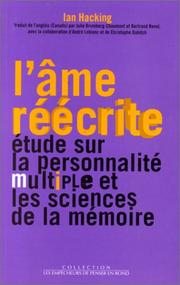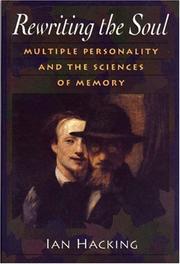| Listing 1 - 3 of 3 |
Sort by
|

ISBN: 2843240212 9782843240218 Year: 1998 Publisher: Le Plessis-Robinson: Institut Synthélabo pour le progrès de la connaissance,
Abstract | Keywords | Export | Availability | Bookmark
 Loading...
Loading...Choose an application
- Reference Manager
- EndNote
- RefWorks (Direct export to RefWorks)
Multiple personality --- Personnalité multiple --- Personnalité multiple --- Memory --- Soul --- Philosophy --- Social aspects --- Psychological aspects --- History --- Multiple personality - Philosophy --- Memory - Social aspects --- Soul - Psychological aspects --- Multiple personality - History --- Multiple personality - Social aspects
Book
ISBN: 9782846711470 284671147X Year: 2006 Publisher: Paris: Les empêcheurs de penser en rond,
Abstract | Keywords | Export | Availability | Bookmark
 Loading...
Loading...Choose an application
- Reference Manager
- EndNote
- RefWorks (Direct export to RefWorks)
L'enquête de Hacking, passionnante de bout en bout, s'inscrit dans un projet plus global : décrire les maladies « éphémères », celles qui apparaissent en un temps et une époque donnés, puis s'estompent ou disparaissent. Ainsi en va-t-il du « trouble de la personnalité multiple » qui a connu une explosion aux États-Unis entre les années 70 et 90, avant de quitter la scène pour les coulisses. Quand Ian Hacking écrit son livre (1995), cette pathologie est au centre de l'actualité américaine. Un certain nombre de psychothérapeutes y voient la réaction d'adultes (des jeunes femmes surtout) face à des abus sexuels subis dans l'enfance et dont le souvenir a été « oblitéré ». Les « alters » (les diverses personnalités habitant un même « individu ») sont le produit de cette oblitération et la guérison de ces patient(e)s passe par le souvenir des abus commis (souvent par les parents). Des milliers de personnes ont ainsi été inculpées pour des crimes commis dans un passé plus ou moins lointain sur la seule base de témoignages rapportés sous hypnose. Certaines ont été condamnées à de lourdes peines de prison. De leur côté, les parents accusés se sont constitués en associations de victimes, imputant aux thérapeutes trop crédules la fabrication sous hypnose de « faux souvenirs » d'abus. Hacking ne se prononce jamais sur la « réalité » de la personnalité multiple, mais, avec une discrète ironie, il montre que les thérapeutes qui y croyaient ont « découvert » des milliers de cas alors que les sceptiques avaient bien du mal à en trouver plus de quelques-uns dans toute l'histoire de la psychopathologie. C'est bien sûr à une leçon d'histoire des sciences que nous invite l'auteur, mais plus profondément encore, à une enquête sur notre « identité » : que sommes-nous sinon nos souvenirs, vrais ou faux ?
Personnalité multiple --- Dissociation (Psychologie) --- Mémoire --- Âme --- Philosophie --- Aspect social --- Histoire --- Aspect psychologique --- Psychologie --- Multiple personality --- Memory --- Soul --- Philosophy --- Social aspects --- Psychological aspects --- History --- Personnalité multiple - Philosophie --- Mémoire - Aspect social --- Personnalité multiple - Histoire --- Personnalité multiple - Aspect social --- Âme - Aspect psychologique --- Multiple personality - Philosophy --- Memory - Social aspects --- Soul - Psychological aspects --- Multiple personality - History --- Multiple personality - Social aspects

ISBN: 1400811937 1282752235 9786612752230 1400821681 069105908X 069103642X 9781400821686 9780691059082 9780691036427 1400803268 Year: 1995 Publisher: Princeton, N.J. Princeton University Press
Abstract | Keywords | Export | Availability | Bookmark
 Loading...
Loading...Choose an application
- Reference Manager
- EndNote
- RefWorks (Direct export to RefWorks)
Twenty-five years ago one could list by name the tiny number of multiple personalities recorded in the history of Western medicine, but today hundreds of people receive treatment for dissociative disorders in every sizable town in North America. Clinicians, backed by a grassroots movement of patients and therapists, find child sexual abuse to be the primary cause of the illness, while critics accuse the “MPD” community of fostering false memories of childhood trauma. Here the distinguished philosopher Ian Hacking uses the MPD epidemic and its links with the contemporary concept of child abuse to scrutinize today’s moral and political climate, especially our power struggles about memory and our efforts to cope with psychological injuries.What is it like to suffer from multiple personality? Most diagnosed patients are women: why does gender matter? How does defining an illness affect the behavior of those who suffer from it? And, more generally, how do systems of knowledge about kinds of people interact with the people who are known about? Answering these and similar questions, Hacking explores the development of the modern multiple personality movement. He then turns to a fascinating series of historical vignettes about an earlier wave of multiples, people who were diagnosed as new ways of thinking about memory emerged, particularly in France, toward the end of the nineteenth century. Fervently occupied with the study of hypnotism, hysteria, sleepwalking, and fugue, scientists of this period aimed to take the soul away from the religious sphere. What better way to do this than to make memory a surrogate for the soul and then subject it to empirical investigation? Made possible by these nineteenth-century developments, the current outbreak of dissociative disorders is embedded in new political settings. Rewriting the Soul concludes with a powerful analysis linking historical and contemporary material in a fresh contribution to the archaeology of knowledge. As Foucault once identified a politics that centers on the body and another that classifies and organizes the human population, Hacking has now provided a masterful description of the politics of memory : the scientizing of the soul and the wounds it can receive.
Memory -- Social aspects. --- Multiple personality -- History. --- Multiple personality -- Philosophy. --- Multiple personality -- Social aspects. --- Soul -- Psychological aspects. --- Multiple personality --- Memory --- Soul --- Learning --- Dissociative Disorders --- Humanities --- Mental Processes --- Mental Disorders --- Psychiatry and Psychology --- Psychological Phenomena and Processes --- Philosophy --- Multiple Personality Disorder --- Psychiatry --- Health & Biological Sciences --- Psychiatric Disorders, Individual --- Social aspects --- History --- Psychological aspects --- Philosophy. --- Social aspects. --- History. --- Psychological aspects. --- Pneuma --- Alternating personality --- Consciousness, Multiple --- DID (Personality disorder) --- Dissociated personality --- Dissociative identity disorder --- Double consciousness --- Double personality --- Dual personality --- MPD (Personality disorder) --- Multiple consciousness --- Multiple identity disorder --- Multiple personalities --- Multiple personality disorder --- Personality, Multiple --- Split personality --- Retention (Psychology) --- -Multiple personality --- Dissociative disorders --- -Future life --- Future life --- Philosophical anthropology --- Theological anthropology --- Animism --- Spirit --- Intellect --- Psychology --- Thought and thinking --- Comprehension --- Executive functions (Neuropsychology) --- Mnemonics --- Perseveration (Psychology) --- Reproduction (Psychology) --- Cognitive psychology --- Multiple Persönlichkeit --- Gedächtnis --- Seele --- Philosophie --- Humans --- Memory (Mental processes) --- Human beings
| Listing 1 - 3 of 3 |
Sort by
|

 Search
Search Feedback
Feedback About UniCat
About UniCat  Help
Help News
News